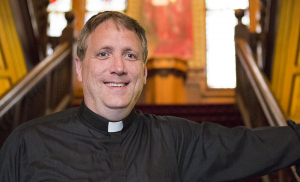
Former Director of Catholic Chaplaincy Fr. Patrick Rogers, S.J., returned to Georgetown this year to work on his doctoral thesis aftter completing a yearlong Tertianship. Rogers is noted for his contributions to ESCAPE, interfaith dialogue and the establishment of the LGBTQ Catholic Prayer.
Former Director of Catholic Chaplaincy Fr. Patrick Rogers, S.J., has returned to Georgetown after completing a yearlong Tertianship, the final program in Jesuit training.
Although Rogers is back on campus to work on his doctoral thesis, he will conduct masses and confession at Georgetown. In his previous nine years at Georgetown, Rogers expanded the ESCAPE program, fostered interfaith dialogue and founded the LGBTQ Catholic Prayer Group, which predated the establishment of the LGBTQ Resource Center.
The Hoya spoke with Rogers last week to discuss his experiences in the Tertianship, his involvement in interfaith and LGBTQ issues and what brought him back to Georgetown.
What kept you at Georgetown for nine years?
There’s a combination of things. I started a doctorate while I was here. You’re called to Tertianship. I was here for a number of years, and my provincial and I were talking about it, and basically preparing for it when I started this doctoral program. So we thought it was best that I finish my classwork and my conference exams, all that stuff first, and then go off to Tertianship.
What was your biggest challenge during your Tertianship?
Every tertian at one point in Tertianship has to do an experiment with the poor, the dying or the sick. So I was sent to Honduras, and I was working at a Jesuit parish there part-time and also teaching music to a Jesuit theater troupe. But I had some very challenging experiences with the parish because there were some remote villages up in the mountains near where we used to have to go, and it was very difficult to get there; very steep mountains, jungles, literally walking through jungle paths, and frankly, I was terrified constantly of the poisonous snakes that are up there.
What inspired you to become involved in Georgetown’s ESCAPE program? When you first started the ESCAPE program, what were your goals?
When I first got involved in ESCAPE, it was literally because I was asked to think about coming to Georgetown specifically to work with the ESCAPE program as a Jesuit. What has really evolved, at least from the time that I took over, is how the directors after me really trained the team on how to be sensitive to people’s issues that are coming on ESCAPE, and how to integrate an Ignatian sensibility in one’s life. This idea that [people are] seeking the magis, always looking for the good in one’s self. The thousands of people that this program has really welcomed to the Hilltop is astounding.
I know that you have participated in a number of interfaith programs. How do you see students of other faiths fitting in at a Catholic university? And I wonder if you have any words about Rabbi Harold White, who passed away last week.
Absolutely. I knew Rabbi White very, very well. We worked together for years, and we even traveled together to the Holy Land. He’s one of the great figures in the history of this university. … He helped this university open itself to new possibilities and deeper possibilities with the Jewish community. … There were many students of other faith traditions that sought out Rabbi White for pastoral care, just because they loved him and could go to him for spiritual guidance, regardless of faith traditions.
What’s extraordinary about this university is that it’s in the Jesuit tradition. Our way of proceeding is to, again, ask deep questions of anybody you’re with. So for example, St. Ignatius, in his day, could ask the person who had no idea of what God even was, or the greatest mystic alive at that time, “Tell me about your experience of the good of grace in your life, or light in your life, or however you want to name goodness in your life. Let’s start a conversation there, and then we can go from there.” So because it’s based on your experience, the student’s experience, it’s open to anyone.
You started an LGBTQ prayer group. Do you believe that the Church under Pope Francis is becoming more tolerant of different sexual orientations? And how have you counseled these students to remain true to their faith even when traditional church doctrine is not supportive?
Doctrine about sexuality hasn’t changed at all in the Catholic Church. So Pope Francis hasn’t changed anything doctrinally about homosexuality in the church. What has changed, I think greatly, is rhetoric about it. … It’s like Pope Francis has given us permission to have a conversation that’s not in the closet, so to speak. And again, Pope Francis is a Jesuit, so this is a very Jesuit way of proceeding. So he’s asking gay and lesbian people and all kinds of people, the poor, whoever it might be, “What is your experience? I’m not going to discount you because your experience is not one that I recognize. I’m going to ask about your experience and engage you from there.”
What is your favorite thing about Georgetown?
My favorite thing about Georgetown is how this again extraordinary university brings such diversity together, and all the fascinating things that happen because of that. Muslim voices, Jewish voices, secular voices, Hindu voices, whatever faith traditions, Protestant, Catholic, all coming together in dialogue with each other, and that’s just the spirituality side. Of course at the university we’re exploring all kinds of amazing ideas, and scholarship, and research. And so that’s what is so extraordinary about Georgetown, all the great things that happen here everyday in this human story. But we’re all Hoyas, and we’re all looking for meaning in our lives. Georgetown helps us find and discover meaning in our lives.




















